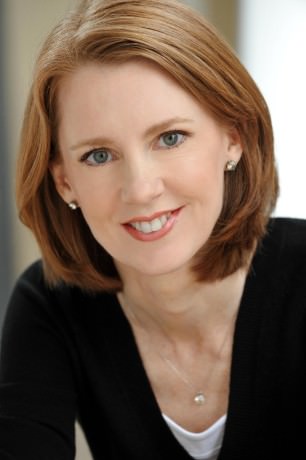Gretchen Rubin is on a mission to change people’s lives for the better. Her insight for learning and curiosity is benefiting millions. One day she realized her life was passing her by and she didn’t want to waste her life. She decided to study happiness and how to create happiness for herself. The results have been astounding. Her three books are best sellers: The Happiness Project, Happier at Home, and Better than Before with over two million in print. She also hosts a podcast with her sister, who she calls the Sage. Her website also provides people with tools to have their own happiness project and better their lives.

Tuesday night, Rubin spoke to a full crowd at the Sixth and I Synagogue. Wearing a pretty pink dress, she stood in the middle of the platform to talk about our habits. One can tell she is passionate about her work and is a vociferous reader and well-versed in her subjects. She was introduced to the audience as, “one of our most thought-provoking writers of our times.” Her new book Better than Before just became an international best seller and focuses on factors influencing our habits.
Rubin started to see patterns in habits and decided to research the topic. Habits are a happiness boost if they are good habits! She conceived the idea to focus on habits after having lunch with a friend who confessed she used to love running with her track team, but now doesn’t run. Why couldn’t she run on her own? Rubin went on a mission to discover why.
Aptitude plus attitude leads to a habit. Habit puzzles included: “Why do dieters gain weight back?” “Why does half the population not take its prescribed medication?” Studying our habits is worth the time as it leads to happiness. Up to 40% of our lives are made up of habits. Habits shape our life. The key to habits is that they save us from making decision as they are automatic.
How does one change a habit? There is no shortage of expert advice. Some strategies work a little, but there is no magic solution. Rubin determined there are 21 different strategies to change habits. The key is to pick one that works for you and stick with it. Suit your habit to yourself.
Rubin exclaimed, “I love all 21 habits! They are fascinating!”
The first habit is called Monitoring. Monitoring is keeping a food journal or tracking your habits.
The second habit is Abstaining/Moderator. As one of Gretchen Rubin’s muses, Samuel Johnson said on wine, “I can’t take a little of wine.” Abstainers are the ones who can’t just have a little ice cream. They will eat the whole tub of ice cream right away if brought home. A Moderator can have one piece of chocolate a day and not eat the whole thing. For Abstainers the best thing to do is not have ice cream in the home at all.
A third habit is The Power of Treats. These are not unhealthy treats, these are treats that rejuvenate the soul when feeling depleted. A person will get a treat when he or she wants it or needs it. A treat energizes you. Treats can be buying something from iTunes once a week, seeing a movie, traveling, etc. For Rubin, doing a podcast with her sister is her treat.
A fourth habit that baffled Rubin that formulated from the same story in the same words she would hear over and over again: “I got back into exercise, I trained for a marathon, I ran the marathon and not run since.” Another one she would hear is, “I quit sugar for 30 days then went right back to sugar.” So when people hit a finish line, they then quit which is very dangerous. “Habits need to be indefinite with no timeline,” explained Rubin and “starting over his harder than starting.” It’s important to see habits as a milestone and not a finish line. This also applies to losing weight. A lot of people lose the weight then gain it back again as they go back to bad habits once they reach their goal weight aka finish line. Losing weight is about creating positive, and healthy indefinite habits.
A fifth habit that surprised the author was the degree in which the orderliness of our lives can lead to calm. Making your bed in the morning leads to more calmness. Even a Navy SEAL commander gave a famous commencement speech about making your bed in the morning. Rubin has heard people say after organizing their lives and cleaning their fridge, “I finally cleaned my fridge and can switch careers!”
A sixth habit is the ‘One Minute Rule.‘ If you can do something that takes less than one minute to do, then do it without delay. Hang up your clothes. Do it in bits and pieces so as not to get overwhelmed.
Rubin then delved into how people fall into four different archtypes when it comes to habits. Neither types are bad or good as there are pros and cons to both.
The first type is the Upholder. The Upholder readily responds to internal and external expectations. They tend to be rule followers. Next to the Rebel it is the second smallest group. Rubin fits into this category which shocked her, but not her husband. “I’m a freaking minority! Most people aren’t like me!,” she exclaimed. An example of her Upholder tendencies is one time she was at a coffee shop and opened up her laptop. Someone told her she wasn’t allowed to do that. Now whenever she goes to a coffee shop she makes sure she is allowed to open her laptop before she opens it. The Upholder is too readily to meet expectations and can be paralyzed without rules.
The second type is the Questioner. This person questions all expectations. She hates to waste time. They must be convinced to do something. They are great for organizations as they make things more efficient. They use spreadsheets and follow their own ideas. They have an appetite for information and won’t stop. They can suffer from analysis paralysis and have a hard time making a decision.
The third type is an Obliger. The Obliger struggles to meet inner expectations like go running by herself, but is motivated by outer expectations like running with a team. They need to be held accountable by outside forces. Best for them to hire a coach or swap work out shoes with a partner to ensure they show up at the gym or join a book club to read a book. Most people are Obligers. Don’t push Obligers too much or they will snap.
The fourth type is a Rebel. A Rebel does whatever she wants to do. They tend to be the smallest tendency. They value freedom and authenticity. They don’t think outside the box, they blow up the box. They don’t like being told what to do. A Rebel will go running barefoot just to be different.
After Ms. Rubin’s talk, she took questions from the audience. She explained how she keeps notes of her research in her computer under “Notes” and tags keys words. She shared how there has been no evidence that birth order has an impact on habits, except genes. She doesn’t believe habit types are tied to gender. Rubin read Andre Agassi’s book Open and it was fascinating to see what an Obliger he is. Habit types are hardwired. It’s hard to tell with children their habit types. It’s best for Rebels and Obligers to date.
Gretchen Rubin’s talk was for one night, March 30, 2015 at Sixth and I Synagogue – 600 I St NW, in Washington, DC. For tickets for future events, purchase them by calling the box office at (202) 408-3100 or online. Check out events here.
https://vimeo.com/68722833
The 4 Ways to Successfully Adopts New Habits
Story and Interview on Today
https://www.youtube.com/watch?v=qNL34_oGWp4




